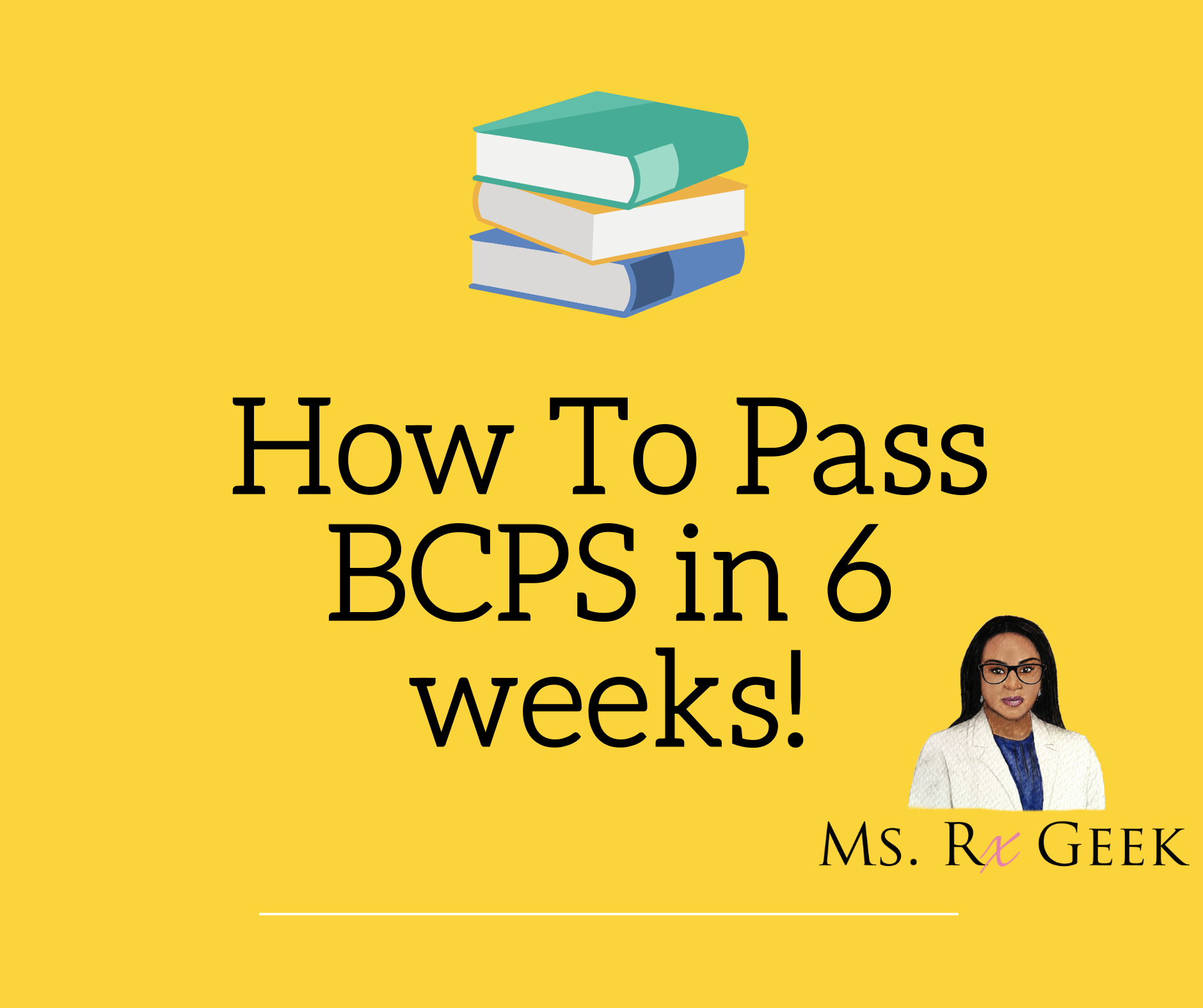November 24, 2020 was when I found out I passed my Pharmacotherapy Certification Exam by the Board of Pharmacy Specialties. Taking this exam was delayed due to various life circumstances and the COVID pandemic but it was such a relief to finally get it out the way. So I could move on to other certifications … like oncology! But I do highly suggest to try to take this exam as soon as possible after completing residency, if possible, as it will make the studying process much easier as concepts will still be fresh in your mind.
“For those who are new to my blog I completed my PGY-1 Residency at Cleveland Clinic with a focus in Oncology and I currently practice as a Hematology/ Oncology Clinical Pharmacist at a large Cancer Center.”
So let’s get to the nitty gritty shall we?
What Materials Did I Use to Study?
Since I am a note taker/highlight type of person I knew right away I needed a book or textbook to assist with my studies. I knew that ACCP (American College of Clinical Pharmacy) would have the perfect material that I would need to pass my certification exam and boy was I right!
I bought the ACCP Updates in Therapeutics: Pharmacotherapy Preparatory Review and Recertification Course Book which helped refresh my memory about specific therapeutic concepts and I truly enjoyed the test/case-based questions provided within each chapter.
This book will touch on every pharmacotherapy concept you need to know for the exam, it is well worth the investment for peace of mind before taking the exam.
What was your Study Schedule Like?
One thing that was tough with studying for BCPS was balancing studying with my very demanding work schedule especially during the COVID pandemic. I would study for about 2- 3 hours daily after work during the weekdays while taking notes simultaneously. I spent about 6 weeks studying and going through the entire book. My studying consisted of reading chapters, taking notes on my iPad of key concepts and practicing questions. See my study schedule below of how to study for BCPS in just 6 weeks!
Order Tramadol 100Mg Online Week 1
- Day 1: Biostatistics
- Day 2: Biostatistics and Study Designs chapter
- Day 3: Fluids, Electrolytes and Nutrition
- Day 4: Complete review of Fluids, Electrolytes and Nutrition
- Day 5: Infectious Disease I (ie. Respiratory Tract Infections; Urinary Tract Infections; Osteomyelitis; Endocarditis; Clostridioides difficile Infection; Surgical Prophylaxis etc.)
http://economiacircularverde.com/que-es-la-economia-circular/ Week 2
- Day 1: Infectious disease I
- Day 2: Infectious disease II (ie. HIV; Opportunistic Infections in Patients with HIV; Tuberculosis; Fungal Pharmacotherapy; Antifungal Agents)
- Day 3: Infectious Disease II
- Day 4: General Psychiatry (This is a big chapter and very detailed)
- Day 5: General Psychiatry
- Day 1: General Psychiatry
- Day 2: Neurology (ie. Epilepsy, Parkinson Disease, Multiple Sclerosis etc.)
- Day 3: Chronic Care in Cardiology (ie. Heart failure, atrial fibrillation, hypertension etc.)
- Day 4: Acute Care in Cardiology (ie. Acute decompensated heart failure, acute coronary syndrome etc.)
- Day 5: Oncology Supportive Care chapter (Also review key chemotherapy classes and their dose limiting adverse effects)
Week 4
- Day 1: Critical Care topics (This is content heavy and may need a couple of days)
- Day 2: Critical Care
- Day 3: Critical Care
- Day 4: Pulmonary Disorders/Gout and Adult Immunizations
- Day 5: Anticoagulation (Pay attention to renal impairment doses, indications and landmark trials)
Week 5
- Day 1: Endocrine and Metabolic Disorders
- Day 2: Geriatrics/ Pharmacokinetics
- Day 3: Nephrology
- Day 4: Gastrointestinal Disorders (ie. GERD, IBD, Diarrhea, Constipation etc.)
- Day 5: Pediatrics
Week 6
- Day 1: Policy, Practice and Regulatory Issues
- Day 2: Men and Womens Health (Understand treatment methods for STD’s and contraindications to oral contraceptives etc.)
- Day 3: Men and Womens Health
- Day 4: Review study notes, key Pharmacotherapy concepts and questions that you answered incorrectly
- Day 5: Review policy and biostatistics and practice calculations such as specificity, sensitivity, positive predictive value etc.
What Advice Do you Have to Provide for Future Test Takers?
The BCPS has shifted to have a larger focus on pharmacotherapy and less on PolicyRegulatory matters so it is important to try to review all pharmacotherapy topics before the exam and review concepts that you struggled with the most, as much as possible.
Understanding and memorizing biostatistics concepts is important. Understand the difference between various types of data and the appropriate statistical tests for certain types of data. Also, ensure to practice calculating concepts such as number needed to treat/harm, positive/negative predictive value, sensitivity/specificity and more. Keep in mind you will not be provided any equations during the test and will have to memorize them.
Before the test try to review the latest guidelines for hypertension, diabetes, heart failure and COPD to ensure you are up to date with what is the latest standard of care before th exam.
And at the end of the day you will do fine, do not stress, study and prepare yourself and you will officially be able to add the 4 letters of BCPS behind your name!
Ms Rx Geek

